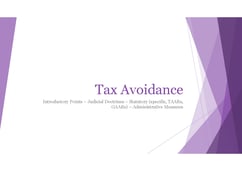Stevenson v Wishart [1987] BTC 283
Judgement for the case Stevenson v Wishart
Table Of Contents
Payments made in exercise of a power over capital were not payments if income and could not be turned into income simply because they were recurrent and applied to an income purpose.
At one time the Revenue sought to argue that payments made out of trust capital could be taxed as income in the hands of the recipient beneficiary even when the payments were not paid in augmentation of an income interest.
The argument was based on its view that the income nature of the payment in the hands of the recipient could be discovered by looking at the size, recurrence and purpose of the payments.
The discretionary trust income was there paid out in full each year to a charity and capital sums were then paid to one of the beneficiaries who had suffered a heart attack. The purpose of the payments was to cover medical expenses and the cost of living in a nursing home.
-
The court held that it was not income.
The CA did stress the exceptional nature of nursing home payments - emergency expenditure of very substantial amounts that would usually fall outside normal income resources.
It may be, therefore, that if the expenditure was not of an emergency nature the court would consider the payments to be income.
A typical example is the payment of school fees out of a trust fund where the Revenue argued for a number of years that lump sum payments could be taxed as the income of the recipient beneficiary in the year when that payment was made.
Fox J
There is nothing in the present case which indicates that the payments were of an income nature except their recurrence. I do not think that is sufficient.
The trustees were disposing of capital in exercise of a power over capital. They did not create a recurring interest in property.
If, in exercise of a power over capital, they chose to make at their discretion regular payments of capital to deal with the special problems of Mrs. Henwood's last years rather than release a single sum to her of a large amount, that does not seem to me to create an income interest.
Their power was to appoint capital. What they appointed remained capital.
For Further Study on Stevenson v Wishart
Need instant answers? Our AI exam tutor is here to help.
Ask questions 🙋 Get answers 📔 It's simple 👁️👄👁️
Our AI is educated by the highest scoring students across all subjects and schools. Join hundreds of your peers today.
Get StartedSimilar Cases
Related Product Samples
These product samples contain the same concepts we cover in this case.
| Tax Law | Income Tax Notes (12 pages) |

 Since 2010, Oxbridge Notes has been a trusted education marketplace, supplying high-quality materials from top achievers at universities like Oxford, Cambridge, LSE, Harvard, and Yale.
Since 2010, Oxbridge Notes has been a trusted education marketplace, supplying high-quality materials from top achievers at universities like Oxford, Cambridge, LSE, Harvard, and Yale.